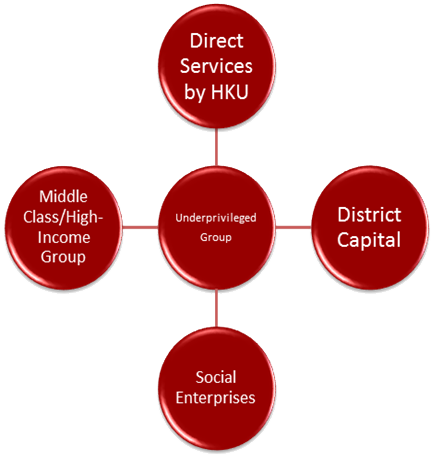THE WAY PROJECT
Project Model
The project model is designed to take advantage of tertiary institution’s capacity to facilitate positive changes in the Southern District and achieve the aims through close collaboration with district-based social groups and partners. The project model will also support HKU students, staff and alumni to apply their knowledge and skills to serve the less privileged. HKU’s role in the project covers the following four domains:
- Knowledge Exchange
- Society and Social Networking
- Research
- Direct Services
The focal point of WAY will be underprivileged groups in the Southern District. Four sets of community resources (resource groups) will be used to help them develop social capital. As the underprivileged groups may also help themselves while being the service recipients, they form the fifth resource group:

Figure: Relations of the five resource groups in the project model
Direct Services by HKU
HKU will organize and mobilize its students, staff and alumni from different backgrounds to provide direct services. For example, tutorial groups, mentorship scheme, community visit programme, etc. will be organized for youth and children in the District. Such programmes can accumulate social capital for participating families and promote their upward mobility.
Middle Class/High-income Group
HKU can facilitate joint projects that bring together different social groups. As a start, WAY will bring students from different backgrounds together. These students will organize activities to serve other needy groups in the District. This model helps underprivileged students to transform from recipients to contributors of the society.
Underprivileged Group
The underprivileged resource group is the service recipient in the model, yet they are also contributors to the society when they interact with other resource groups in the model.
District Capital
This resource group encompasses hidden and overlooked treasures in the District. For instance, stories and pictures about the fishing industry and the elderly are invaluable cultural treasures. Country parks and costal life are also precious natural treasures. Cultural heritage can be resurrected and reintroduced to people in and outside Hong Kong.
Social Enterprises
In addition to direct services, HKU will carry out knowledge exchange and research projects to help develop social enterprises in the District. Such enterprises will, on one hand, meet certain community needs (e.g. elderly care); while on the other hand, provide employment opportunities for those who need a job (e.g. low-income women).
